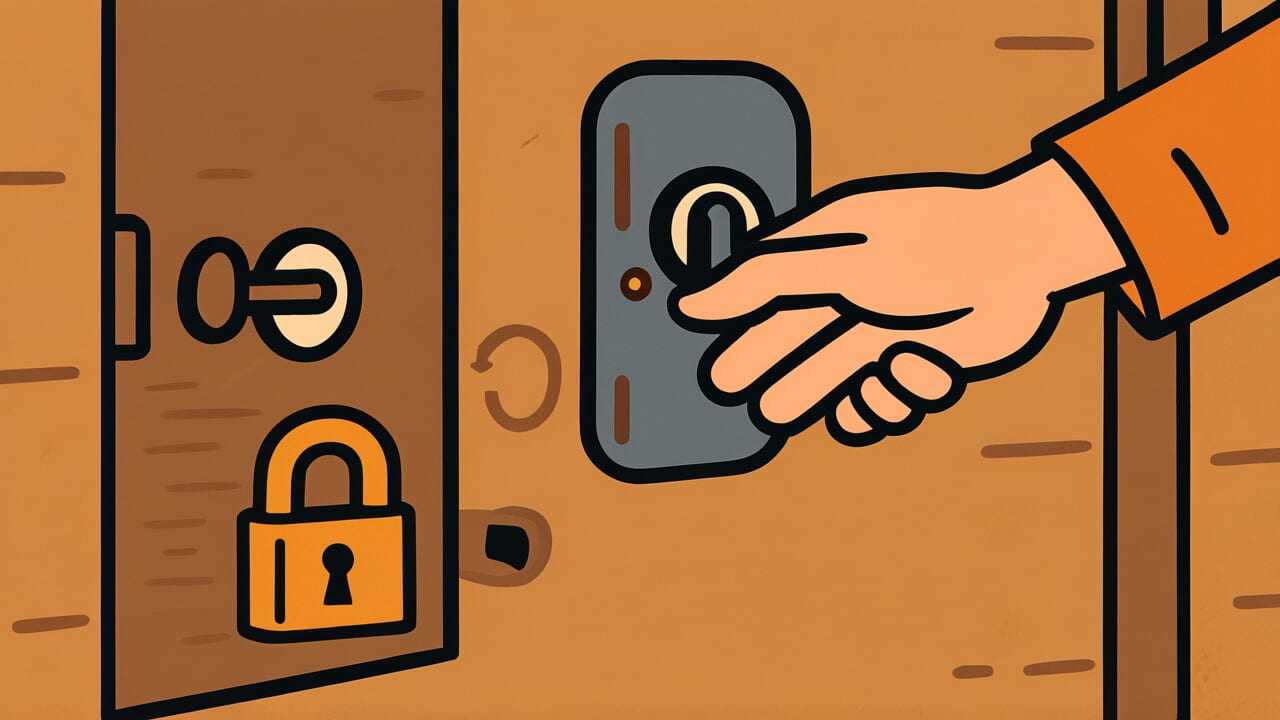How to Read “A bad padlock invites a picklock”
A bad padlock invites a picklock
[uh BAD PAD-lok in-VITES uh PIK-lok]
Meaning of “A bad padlock invites a picklock”
Simply put, this proverb means that weak security makes people more likely to try breaking in.
The literal words paint a clear picture. A bad padlock is one that looks flimsy or broken. A picklock is someone who opens locks without keys. When thieves see an easy target, they feel encouraged to try their luck.
This wisdom applies far beyond actual locks and doors. Poor passwords invite hackers to try breaking into accounts. Leaving valuables visible in cars tempts thieves to smash windows. When we make it easy for others to take advantage, we practically invite trouble. The proverb reminds us that weak defenses often create the very problems we want to avoid.
What makes this saying powerful is how it shifts responsibility. Instead of just blaming the thief, it points out our role in the situation. When we fail to protect what matters to us, we make ourselves attractive targets. The proverb suggests that good security prevents many crimes before they start.
Origin and Etymology
The exact origin of this proverb is unknown, though it appears to be several centuries old. Early versions can be found in collections of English sayings from the 1600s and 1700s. The language suggests it developed during a time when padlocks were common household items.
During those centuries, most people secured their belongings with simple metal locks. Quality varied greatly between expensive and cheap versions. A sturdy padlock meant serious protection, while a flimsy one barely slowed down determined thieves. People learned quickly that visible weakness invited trouble.
The saying spread through practical experience rather than books. Merchants, travelers, and homeowners shared this wisdom because they lived it daily. Over time, people began using it for situations beyond actual locks. The core message about weakness inviting exploitation proved useful in many areas of life.
Interesting Facts
The word “padlock” comes from “pad,” an old term meaning a small basket or container. Early padlocks resembled little metal boxes that protected the locking mechanism inside.
“Picklock” originally meant both the tool used to open locks and the person using it. The term dates back to the 1500s when lock-picking was a recognized criminal skill.
This proverb uses perfect rhyme and rhythm, making it easy to remember. The matching sounds of “padlock” and “picklock” help the saying stick in people’s minds.
Usage Examples
- Sarah noticed her neighbor’s broken gate latch: “You should fix that soon. A bad padlock invites a picklock, and your yard has nice plants someone might steal.”
- The IT manager explained the new password rules: “I know these requirements seem strict, but remember, a bad padlock invites a picklock. Weak passwords are like leaving your front door wide open.”
Universal Wisdom
This proverb reveals a fundamental truth about human nature and opportunity. Throughout history, people have observed that visible weakness creates temptation even in those who might not otherwise act dishonestly. The saying captures how environmental factors shape behavior in ways we often overlook.
The wisdom goes deeper than simple crime prevention. It recognizes that humans are naturally opportunistic creatures who respond to what they perceive as easy gains. When we display vulnerability, we trigger ancient survival instincts in others. This isn’t necessarily about evil intentions, but about how our brains are wired to notice and exploit weaknesses for advantage.
What makes this observation universally relevant is how it applies across all human interactions. Weak boundaries invite people to push further. Poor preparation invites others to take advantage. Visible desperation invites exploitation. The proverb acknowledges an uncomfortable reality: our own carelessness often creates the conditions that harm us. This understanding has helped communities develop better protective strategies for thousands of years, recognizing that prevention often works better than punishment after the fact.
When AI Hears This
Weak security doesn’t just fail to protect. It actively creates the very threats it fears. A flimsy lock sends invisible signals to potential thieves. These signals say “easy target here” louder than any advertisement. People who never considered stealing suddenly notice the opportunity. The weakness transforms ordinary passersby into criminals by broadcasting vulnerability.
Humans believe security problems are simply about prevention failing. They miss how poor defenses actually manufacture new dangers. Bad security creates a feedback loop that breeds predators. It’s like leaving food out and wondering why animals appear. The vulnerability doesn’t wait passively for exploitation. Instead, it actively recruits its own destruction through silent communication.
This pattern reveals something beautiful about human adaptability. People constantly scan their environment for opportunities and risks. A broken fence doesn’t just allow trespassing. It teaches neighbors that rules aren’t enforced here. This creates cascading effects throughout entire communities. What seems like simple negligence actually demonstrates humanity’s incredible sensitivity to environmental cues and social signals.
Lessons for Today
Understanding this wisdom means recognizing our active role in our own security. Rather than just hoping others will respect our boundaries, we can take concrete steps to protect what matters. This doesn’t mean living in fear, but rather being realistic about how visible weakness affects human behavior.
In relationships and work situations, this translates to setting clear expectations and maintaining consistent standards. When we’re vague about our limits or inconsistent in enforcing them, we inadvertently signal that pushing boundaries is acceptable. Strong, clear communication often prevents conflicts that weak signals might encourage.
The challenge lies in finding balance between reasonable protection and excessive paranoia. Good security feels natural and proportionate to actual risks. The goal isn’t to become suspicious of everyone, but to remove unnecessary temptations that might turn honest people into opportunists. This ancient wisdom reminds us that a little prevention often saves us from much larger problems later.



Comments